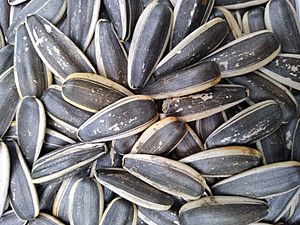Guazi facts for kids

Guazi or kuaci
|
|
| Alternative names | Kuaci (Indonesian) |
|---|---|
| Course | Snack |
| Region or state | East Asia and Southeast Asia |
| Associated national cuisine | China and Indonesia |
Guazi (pronounced gwah-zee) is a super popular snack in many parts of Asia. It's basically roasted plant seeds. You might also hear it called kuaci in Indonesia or kwasi in Malaysia.
Even though the name "guazi" means "melon seeds," it usually refers to baked seeds from sunflowers, pumpkins, or watermelons. People often enjoy guazi as a snack, especially during big meals or celebrations.
Contents
Discovering Guazi's Past
Have you ever wondered how long people have been eating snacks like guazi? The oldest records of people eating guazi come from an ancient Chinese book called the Taiping Huanyu Ji. We don't know exactly what kind of seeds they ate back then.
Early Seed Snacking
Watermelon seeds were the first type of guazi eaten in China. This started way back during the Tang Dynasty (a very old time in Chinese history). Eating these seeds became really popular later, during the Ming dynasty and Qing dynasty.
The Wanli Emperor, a ruler from the Ming Dynasty, loved eating fresh watermelon seeds. A writer named Liu Ruoyu even wrote that the emperor enjoyed them baked with salt!
There's even an old folk song from the late Ming period. It tells a story about a girl giving a bag of shelled seeds to someone she cared about.
Modern Seed Popularity
Pumpkin and sunflower seeds became common snacks much later, after the Qing Dynasty.
A famous writer named Feng Zikai noticed how much people loved eating seeds. He even wrote a whole book about it, called Eating Guazi.
Even important leaders enjoyed guazi! Quan Yanchi wrote in his book, Leaders Around the Dining Table, that Mao Zedong and Liu Shaoqi liked eating guazi. These leaders were very important figures in Chinese history.
What Guazi Means
Eating guazi can take a lot of time. You have to crack open each tiny seed to get the small piece inside. Because of this, the act of eating guazi became a way to describe wasting time. It was sometimes used to talk about wasting money, especially money that belonged to everyone, like taxpayer money.
Types of Guazi
Guazi can be made from different kinds of seeds. Here are the most common ones:
 | Janet Taylor Pickett |
 | Synthia Saint James |
 | Howardena Pindell |
 | Faith Ringgold |

